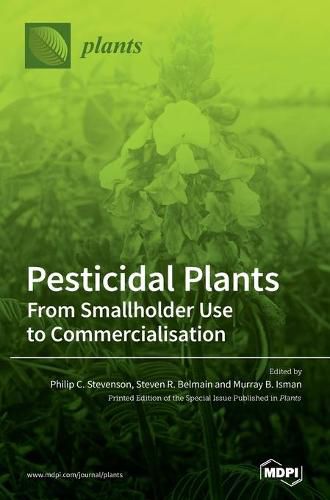Readings Newsletter
Become a Readings Member to make your shopping experience even easier.
Sign in or sign up for free!
You’re not far away from qualifying for FREE standard shipping within Australia
You’ve qualified for FREE standard shipping within Australia
The cart is loading…






This title is printed to order. This book may have been self-published. If so, we cannot guarantee the quality of the content. In the main most books will have gone through the editing process however some may not. We therefore suggest that you be aware of this before ordering this book. If in doubt check either the author or publisher’s details as we are unable to accept any returns unless they are faulty. Please contact us if you have any questions.
The global biodiversity and climate emergencies demand transformative changes to human activities. For example, food production relies on synthetic, industrial and non-sustainable products for managing pests, weeds and diseases of crops. Sustainable farming requires approaches to managing these agricultural constraints that are more environmentally benign and work with rather than against nature. Increasing pressure on synthetic products has reinvigorated efforts to identify alternative pest management options, including plant-based solutions that are environmentally benign and can be tailored to different farmers’ needs, from commercial to small holder and subsistence farming. Botanical insecticides and pesticidal plants can offer a novel, effective and more sustainable alternative to synthetic products for controlling pests, diseases and weeds. This Special Issue reviews and reports the latest developments in plant-based pesticides from identification of bioactive plant chemicals, mechanisms of activity and validation of their use in horticulture and disease vector control. Other work reports applications in rice weeds, combination biopesticides and how chemistry varies spatially and influences the effectiveness of botanicals in different locations. Three reviews assess wider questions around the potential of plant-based pest management to address the global challenges of new, invasive and established crop pests and as-yet underexploited pesticidal plants.
$9.00 standard shipping within Australia
FREE standard shipping within Australia for orders over $100.00
Express & International shipping calculated at checkout
This title is printed to order. This book may have been self-published. If so, we cannot guarantee the quality of the content. In the main most books will have gone through the editing process however some may not. We therefore suggest that you be aware of this before ordering this book. If in doubt check either the author or publisher’s details as we are unable to accept any returns unless they are faulty. Please contact us if you have any questions.
The global biodiversity and climate emergencies demand transformative changes to human activities. For example, food production relies on synthetic, industrial and non-sustainable products for managing pests, weeds and diseases of crops. Sustainable farming requires approaches to managing these agricultural constraints that are more environmentally benign and work with rather than against nature. Increasing pressure on synthetic products has reinvigorated efforts to identify alternative pest management options, including plant-based solutions that are environmentally benign and can be tailored to different farmers’ needs, from commercial to small holder and subsistence farming. Botanical insecticides and pesticidal plants can offer a novel, effective and more sustainable alternative to synthetic products for controlling pests, diseases and weeds. This Special Issue reviews and reports the latest developments in plant-based pesticides from identification of bioactive plant chemicals, mechanisms of activity and validation of their use in horticulture and disease vector control. Other work reports applications in rice weeds, combination biopesticides and how chemistry varies spatially and influences the effectiveness of botanicals in different locations. Three reviews assess wider questions around the potential of plant-based pest management to address the global challenges of new, invasive and established crop pests and as-yet underexploited pesticidal plants.